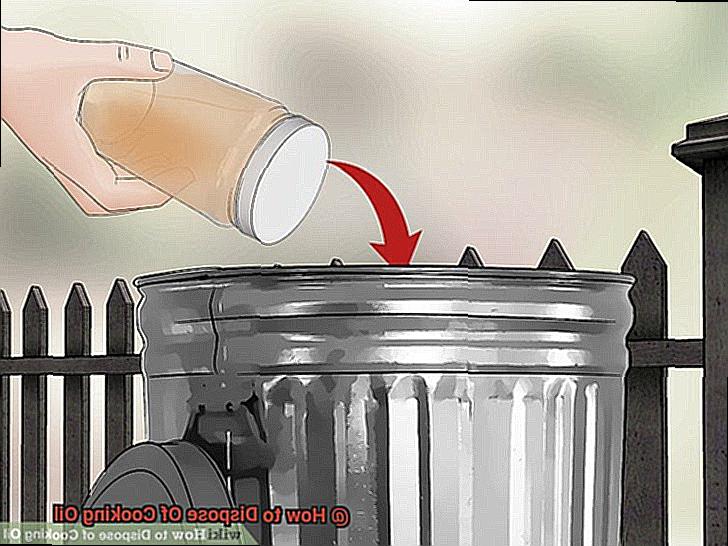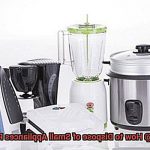Cooking oil is a common ingredient in many delicious meals, but disposing of it can be a real headache.
Pouring it down the drain might seem like an easy solution, but it can cause serious damage to your pipes and the environment. And throwing it in the garbage?
Well, let’s just say that’s not a pleasant option either. But fear not.
There are safe and simple ways to dispose of cooking oil without harming the planet or dealing with any unpleasant odors. In fact, you might even be surprised by all the creative ways you can repurpose your used cooking oil.
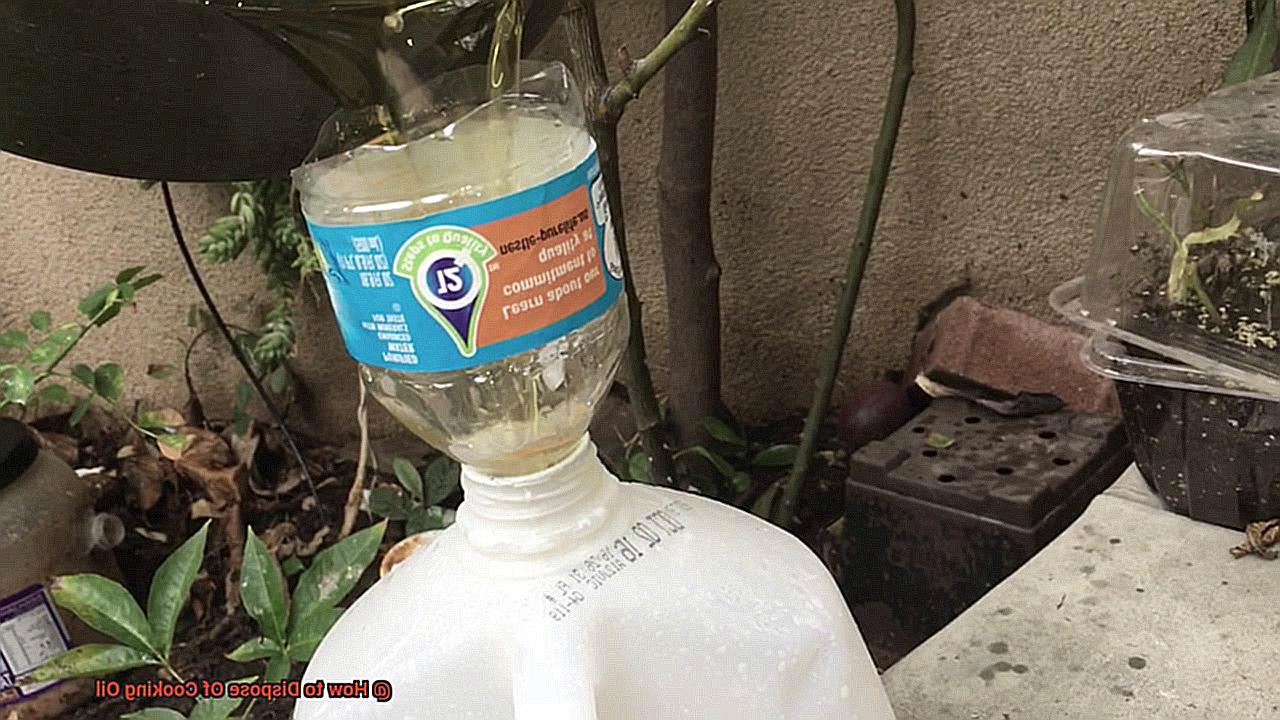
Have you ever thought about turning your old cooking oil into candles or soap? Or using it as a natural fertilizer for your garden?
We’ll also delve into why proper disposal techniques are so important, both for our own well-being and that of our planet.
So, let’s get ready now.
What Not to Do When Disposing of Cooking Oil
Contents
Improper disposal can have serious consequences on both your plumbing system and the environment. Let’s start with the golden rule: never pour your used cooking oil down the drain.
This seemingly easy solution can lead to costly and frustrating clogs and blockages in your pipes. Instead, opt for safer and more eco-friendly options like recycling or reusing your cooking oil.
Tossing used cooking oil in the garbage may seem like a better alternative, but it’s not without its drawbacks. When mixed with other waste in landfills, cooking oil can produce harmful methane gas that contributes to greenhouse gas emissions.
So, what’s the solution? Consider composting or finding local facilities that accept used cooking oil for recycling purposes.
Pouring your used cooking oil into outdoor spaces like yards or gardens can also cause problems. Not only does it attract unwanted pests like rodents and insects, but it can also contaminate soil and harm plants.
Instead, dispose of your cooking oil in a sealed container and take it to a designated recycling or disposal center. And lastly, don’t mix different types of cooking oils together when disposing of them.
This can create hazardous chemicals that make it difficult to recycle or dispose of properly. So, separate various types of oils and dispose of them individually.
Remember, proper disposal of cooking oil is crucial for both your own safety and the environment. By following these tips, you can protect your plumbing system, prevent environmental harm, and ensure safe and responsible disposal practices.
Reusing Cooking Oil
Reusing cooking oil can be a great way to save money and reduce waste, but it’s important to do so safely and responsibly.
Improperly reused cooking oil can become rancid and produce harmful chemicals when heated. To safely reuse cooking oil, start by straining it through a fine-mesh sieve or cheesecloth to remove any food particles or debris.
This will help extend the life of the oil and prevent it from burning during future use. It’s also important to pay attention to the smoke point of the oil.
Different oils have different smoke points, which is the temperature at which the oil begins to break down and smoke. Using oil past its smoke point can produce harmful chemicals and should not be used.
It’s recommended that cooking oil be reused only a few times before being discarded. If the oil looks cloudy or has an off-smell, it should be thrown away immediately.
Storing used cooking oil in an airtight container in a cool, dark place will prevent it from going rancid. When it’s time to dispose of the used cooking oil, never pour it down the drain or toilet.
This can cause damage to plumbing systems and lead to clogs. Instead, pour the oil into a sealable container such as a jar or plastic bottle.
Some cities offer recycling programs for used cooking oil, so check with your local government to see if this is an option for you. In summary, reusing cooking oil can save money while reducing waste, but it’s important to do so safely and effectively.
Recycling Cooking Oil
Recycling it could be the answer you’ve been looking for.
Not only is it an environmentally friendly way to dispose of it, but it also saves you money and reduces waste. In this article, we’ll explore the many benefits of recycling cooking oil and how to do it.
Firstly, recycling cooking oil is a safe way to dispose of it. Pouring used cooking oil down the drain can cause serious damage to pipes and lead to costly repairs.
Additionally, throwing it in the trash can attract pests and rodents. Recycling cooking oil helps prevent pipe clogging and reduces the amount of waste in landfills.
Secondly, converting cooking oil into biodiesel can also be beneficial. Biodiesel is a renewable energy source made from vegetable oils or animal fats and can be used as a substitute for diesel fuels.
It’s a more eco-friendly alternative to traditional fossil fuels. So, how do you recycle cooking oil?
There are several options available. One option is to take it to a recycling center or facility that accepts used cooking oil.
These facilities have the capacity to collect large amounts of used oil and can either sell it off or process it into biodiesel. Another option is to reuse the cooking oil yourself.
This can be done by straining it after each use and storing it in a clean, airtight container. Used cooking oil can be used up to three times before it starts to break down and become rancid.
So, recycling cooking oil is an eco-friendly way of disposing of it. It can be reused or taken to a recycling facility where it can be processed into biodiesel.
Disposing of Cooking Oil in the Trash
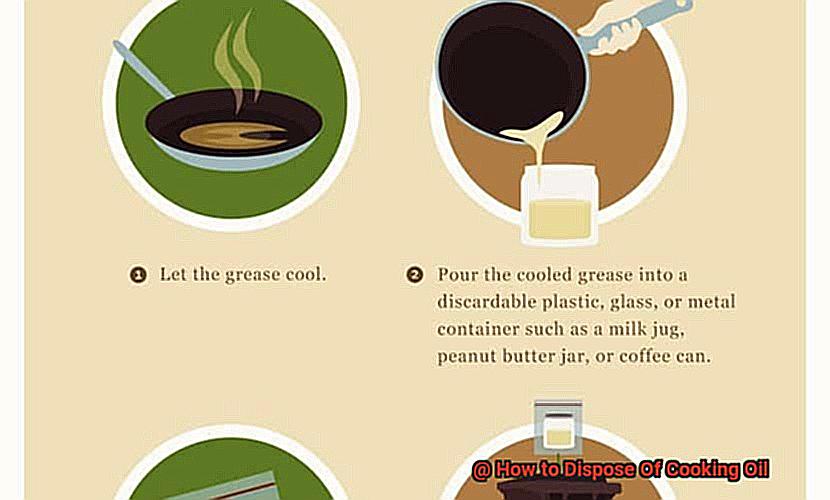
While recycling might be the best option, it might not always be possible. So, what do you do if you can’t recycle your cooking oil?
The answer is simple: throw it in the garbage. But before you pour your leftover oil down the drain or toilet, let’s discuss why this is a bad idea.
Not only can it lead to clogged pipes and sewage backups, but it can also contaminate the soil and water supply if it ends up in a landfill. So, let’s explore how to dispose of cooking oil in the garbage safely and responsibly.
The first step is to allow the used cooking oil to cool completely before handling it. Hot oil can cause severe burns and melt plastic containers, so wait a few days before moving on to the next step.
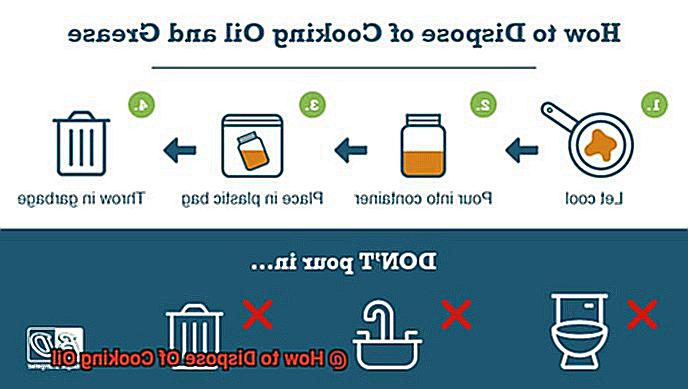
Once cooled, pour the oil into a sealable container, such as a plastic bottle or jar. Label the container as “cooking oil” so that others know what’s inside.
To prevent leaks or spills, place the container in a plastic bag or wrap it in newspaper. This not only keeps your garbage cans clean but also prevents any potential damage to your plumbing or environment.
Finally, dispose of the bagged container in your normal household garbage.
Keep in mind that some municipalities may have specific guidelines or rules for disposing of cooking oil in the garbage, so check with your local waste management department for any restrictions or requirements.
While recycling cooking oil is ideal, disposing of it in the garbage can be an eco-friendly option if done correctly. Follow these simple steps to avoid clogged pipes, sewage backups, and environmental contamination.
Remember to let your oil cool completely, use a sealable container, bag it properly, and dispose of it in your regular household trash.
Key Takeaways for Safely Disposing of Cooking Oil
With these key takeaways, you can safely and responsibly get rid of that leftover oil without causing harm to your plumbing system or the environment.
Firstly, never pour cooking oil down the drain or toilet. This can lead to clogged pipes and major damage to your plumbing system.
Instead, store your used cooking oil in a sealable container labeled clearly as “cooking oil” until you can properly dispose of it. Secondly, check with your local recycling center or waste management facility to see if they accept used cooking oil for recycling.
Some cities have designated drop-off locations for this purpose. Not only will you be doing your part for the environment, but you may also be able to help create renewable energy sources.
Thirdly, if recycling is not an option, mix the used cooking oil with an absorbent material such as cat litter or sawdust. This will solidify the oil and make it easier to dispose of in the trash.
Just remember to use a sealable container and label it clearly as containing used cooking oil.
Finally, keep in mind that different types of cooking oils may require different methods of disposal.
For example, animal fats such as bacon grease may solidify at room temperature and can be scraped into the trash, whereas vegetable oils may need to be mixed with an absorbent material before disposal. So there you have it.
Benefits of Properly Disposing of Cooking Oil
Cooking oil is a vital ingredient in any kitchen, but what many people don’t realize is that improperly disposing of used cooking oil can have a significant impact on the environment, your plumbing, and even your wallet.
Here, we’ll explore the numerous benefits of properly disposing of cooking oil.
Plumbing
Pouring used cooking oil down the drain may seem like an easy option, but it can lead to costly repairs in the future.
When oil cools and solidifies, it creates blockages in your pipes, resulting in backups and even bursts.
Properly disposing of your used cooking oil by storing it in a labeled, sealable container and recycling it at a local facility will prevent plumbing nightmares.
Another significant benefit of proper disposal is reducing the risk of fires.
Cooking oil is highly flammable and can quickly ignite if not treated correctly, causing dangerous fires. By properly disposing of your used cooking oil, you can significantly reduce this danger while keeping yourself and others safe.
Environment
Improperly disposed of cooking oil can result in soil and water contamination, causing harm to wildlife and ecosystems.
However, we can reduce emissions and protect our planet by using appropriate disposal techniques such as recycling or donating to biodiesel plants. Finally, there are economic benefits to consider as well.
Some cities have programs for recycling used cooking oil, which can be turned into biodiesel fuel or used for other purposes. By participating in these programs, you can help create jobs and support your local economy.
Conclusion
In conclusion, disposing of cooking oil properly is essential for both our health and the planet’s well-being.
Dumping used cooking oil down the drain can cause severe damage to pipes, leading to costly repairs. Throwing it in the garbage can attract pests and pollute soil and water supplies if it ends up in a landfill.
Moreover, it produces harmful methane gas that contributes to greenhouse gas emissions. Thankfully, there are several safe and straightforward ways to dispose of cooking oil without harming the environment or dealing with any unpleasant odors.
Recycling and reusing your cooking oil are eco-friendly alternatives that can save you money while minimizing waste.
Additionally, repurposing your used cooking oil by making candles or soap or using it as natural fertilizer for your garden is an excellent way to reduce waste.
Remember always to let your oil cool completely before handling it, use sealable containers labeled specifically as “cooking oil,” check with local recycling centers or waste disposal facilities for their instructions on disposing of used cooking oil, mix various types of oils separately before disposal, and pay attention to smoke points when reusing cooking oil.
We all have a role to play in protecting our plumbing system by following these guidelines.
By doing so, we can prevent environmental damage, create renewable energy sources, reduce emissions, support local economies, and ensure safe and responsible disposal practices.
